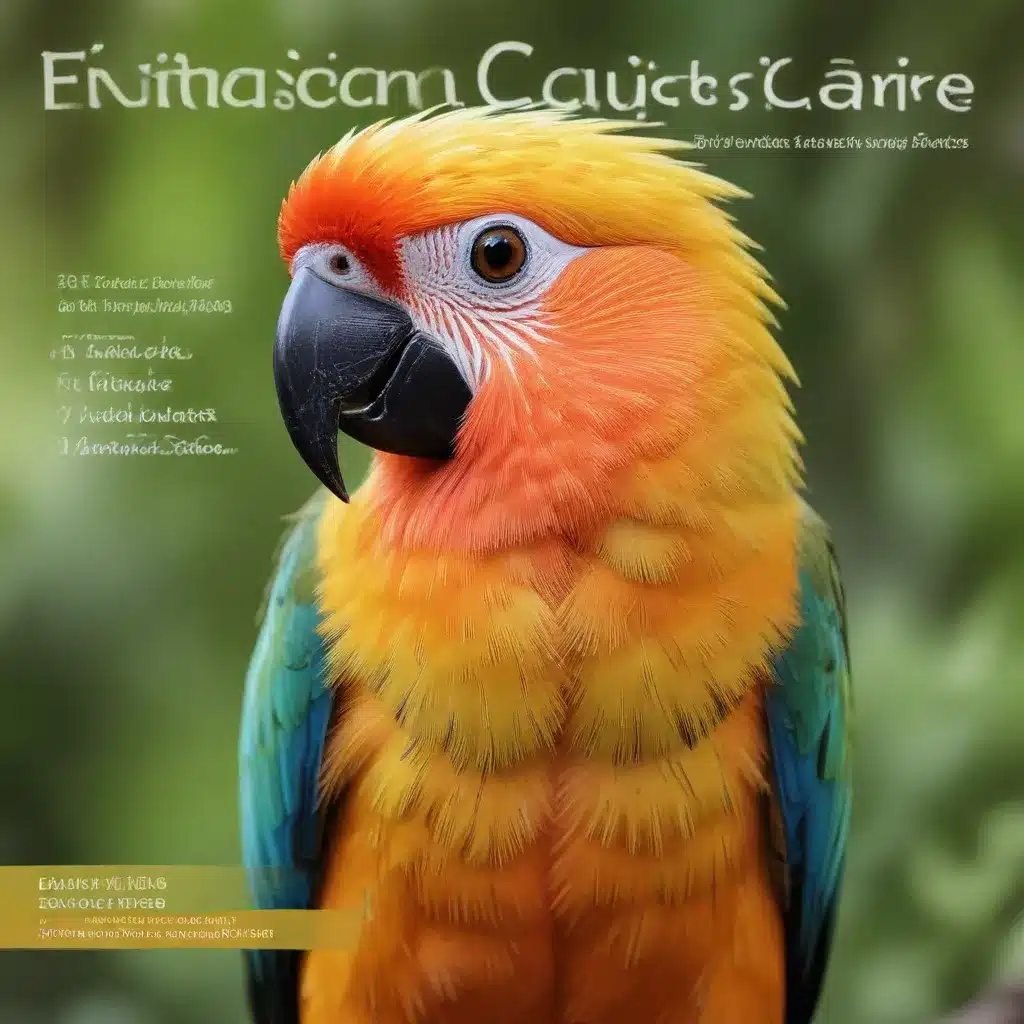
Exotic Bird Care: Empowering Bird Owners Through Evidence-Based Practices
Exotic Bird Species
As an experienced avian caretaker, I’ve had the privilege of working with a wide variety of fascinating bird species. From the vibrant plumage of parrots to the striking features of macaws, each bird is a unique individual with its own captivating personality.
Parrots are perhaps the most popular exotic bird companions, known for their intelligence, playfulness, and ability to form strong bonds with their human caregivers. Species like cockatoos, conures, and macaws are especially popular, prized for their endearing qualities and stunning appearances. However, it’s crucial that prospective owners understand the substantial commitment required to provide these birds with the care and enrichment they need to thrive.
Cockatoos, for example, are affectionate yet demanding birds that can become anxious or destructive without proper socialization and outlets for their boundless energy. Macaws, with their impressive size and striking colors, are equally intelligent and require meticulous attention to their dietary and environmental needs. Conures, on the other hand, are smaller yet no less engaging, known for their clownish antics and vibrant vocalizations.
Regardless of the specific species, exotic birds share a fundamental need for a stimulating, species-appropriate environment, a balanced diet, and regular interaction and training. By understanding the unique characteristics and requirements of each bird, owners can create a nurturing, enriching home that empowers their feathered companions to thrive.
Avian Behavior and Enrichment
Observing the natural behaviors of exotic birds is key to providing an environment that caters to their physical and psychological needs. In the wild, these intelligent creatures engage in a wide range of activities, from foraging and flying to social bonding and play. Replicating these behaviors in captivity is essential for their well-being.
Cage design and the inclusion of various accessories play a crucial role in facilitating natural behaviors. Perches of varying sizes and textures encourage birds to climb, hop, and roost, while the addition of toys, foraging opportunities, and safe areas for nesting and hiding can stimulate their innate curiosity and problem-solving skills.
Socialization and training are also vital components of exotic bird care. Positive reinforcement techniques can help birds develop trust and form strong bonds with their human caregivers, while also teaching them to voluntarily participate in essential husbandry procedures, such as veterinary examinations and grooming. By empowering birds to make choices and have control over their experiences, owners can create a harmonious and enriching relationship.
Evidence-Based Avian Husbandry
Providing a balanced and species-appropriate diet is one of the most critical aspects of exotic bird care. A well-formulated diet, rich in essential vitamins, minerals, and nutrients, supports optimal health and vitality. This may include a combination of high-quality pellets, fresh fruits and vegetables, and occasional treats.
Maintaining a consistent feeding schedule, with appropriate portion sizes, is also important to ensure birds receive the nourishment they need without overindulging. By closely monitoring their dietary intake and body condition, owners can make adjustments to ensure their birds maintain a healthy weight and avoid nutritional deficiencies or excesses.
Vigilant preventative care is essential for the long-term well-being of exotic birds. Regular veterinary check-ups, along with proactive steps to address common health issues, such as feather-plucking, respiratory infections, and gastrointestinal disorders, can help catch problems early and minimize the risk of serious complications. By staying informed and diligent, owners can empower their birds to live happy, healthy lives.
Empowering Bird Owners
Equipping bird owners with reliable, evidence-based information is crucial for promoting responsible ownership and ensuring the well-being of these remarkable creatures.
Educational resources, such as blogs, publications, and local avian clubs, can provide a wealth of knowledge on topics ranging from species-specific care to enrichment techniques and common health concerns. By staying informed and connected with a community of like-minded enthusiasts, owners can make informed decisions and feel empowered to give their birds the best possible care.
Responsible ownership also requires a lifetime commitment to the birds in one’s care. Prospective owners must thoroughly research the specific needs of their desired species, ensure they have the time, resources, and dedication to meet those needs, and be prepared to provide a loving, enriching home for the entirety of the bird’s lifespan, which can span decades for some species.
Advances in Avian Science
As our understanding of avian behavior and cognition continues to evolve, so too do the best practices for exotic bird care. Researchers are delving deeper into the complex social, emotional, and problem-solving capabilities of these intelligent creatures, offering new insights that can inform more enriching and empowering approaches to captive management.
Emerging studies on habitat enrichment, for example, highlight the importance of providing birds with a diverse and stimulating environment that caters to their innate behavioral needs. From intricate foraging opportunities to novel toys and perches, these advances in environmental design can significantly improve the overall well-being of birds in human care.
Equally exciting are the strides being made in avian conservation efforts, with dedicated breeding programs working to safeguard the future of threatened and endangered species. By sharing their knowledge and collaborating with bird owners, these initiatives are empowering a new generation of caretakers to play a vital role in preserving the incredible diversity of the avian world.
As an experienced avian caretaker, I’m thrilled to see the continued progress in our understanding and care of exotic birds. By staying at the forefront of these advancements and empowering bird owners with the latest, evidence-based practices, we can ensure that these remarkable creatures receive the enriching, fulfilling lives they deserve.


